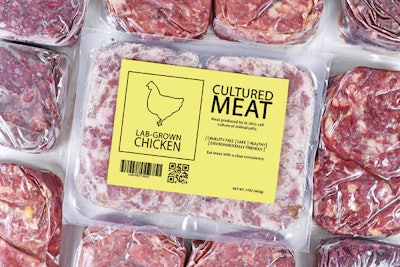
Would you eat laboratory-grown meat? If your answer is in the negative, you are not alone, as 95% of Italians say that they wouldn’t either.
A dossier on laboratory-grown meat published late last year by Italian agricultural association Coldiretti, working with market research company Ixe, reveals why Italians reject lab-grown meat and looks at some the claims and myths that surround cultured meat products.
Why not cultured meat?
According to Coldiretti, 96% of Italians consume meat, with an average frequency of 2.7 times a week. Italian consumers believe that eating the right amount of meat, be it red or white, is good for health. This belief, however, does not extend to meat grown in the laboratory, with only 5% of respondents to the Ixe survey stating that they would be willing to try cultured meat.
Asked why they would not eat lab-grown meat, 68% of those questioned said that they did not trust what was not natural, while 60% feared that it may not be good for their health.
Would laboratory-grown meat have the same flavor as farm-produced meat? Forty-two percent of Italians felt that it would not, while 18% worried about its impact on the environment.
Such products would be rejected by vegetarians and vegans, the dossier says, as they come from animals.
What consumers want
What do Italians want? First and foremost, they want meat to come from an Italian farm. Next, they want labelling that is detailed, and that any product comes from a company in Italy. Price and convenience were then viewed as important, followed by brand.
Coldiretti and Ixe have also looked at the various claims that are made about laboratory-grown meat and that might tempt consumers to try the product, a along with other issues surrounding so-called clean meat.
Is laboratory-grown meat good for the environment? The dossier quotes a study from Oxford Martin School that looks at the environmental impact of laboratory beef. The study found that, because of intense energy consumption, there could be a greater impact on global warming from producing meat in the laboratory than by producing real meat on farm.
Laboratory-grown meat needs water and, over the long-term, this could exceed that needed by numerous farms. Additionally, it results in enormous amounts of organic molecules and chemicals that, as water-borne residues, could poison watercourses.
Neither will cultured meat reduce animal suffering as it depends on using bovine fetal serum.
Coldiretti also rejects the use of the term cultured meat as, it says, it has associations with plants and health. Cultured meat is a synthetic product that comes from a laboratory and has nothing to do with food, the association notes.
Coldiretti also notes that the high level of cellular proliferation that occurs to produce laboratory grown meat could cause genetic instability, which may support the potential proliferation of sporadic cancer cells, and it argues, it remains unclear whether all of the chemicals used in culturing meat are safe if consumed in food.
Laboratory-grown meat goes by different names. When quizzed, approximately 25% of respondents viewed the term "clean meat" positively, while a little over 28.3% saw the term as negative. Only 5.3% views the term "artificial meat" positively, while over 71% saw it as negative.
Study: US consumers leery of lab-grown meat
www.WATTAgNet.com/articles/30440


















